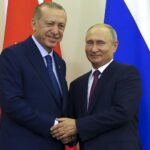For the first time since the elections, the newly elected President of Finland Alexander Stubb has clearly expressed his position regarding Ukraine and Russia while in office.
Friend or enemy
Finland is Russia’s immediate neighbor; therefore, despite the numerous conflicts between these two countries, a large number of politicians here traditionally favor the establishment of relations with the empire, which can revive trade, economic, educational, cultural, and other interactions between the two states. That is why this program point becomes relevant during every election because it can easily come to power through the electorate’s support, timely “catching” the mood of the citizens. For this reason, the first speeches of the head of state are essential and make clear the vector of the country’s movement during the cadence.
Alexander Stubb demonstrated his support for Kyiv even when he was the Prime Minister of Finland, and during the election campaign, he also touched on this topic several times. However, he did not bet on it as the main one.
There is no choice
Stubb’s statement is clear: Finland will not stop supporting Ukraine. The newly elected President emphasized that today, this position for the country is not only in the field of foreign policy but is considered a factor of its security and even existence.
Such statements are not unfounded, and they are confirmed by several factors:
– Finland is constantly expanding cooperation with NATO;
– the eastern Finnish borders with Russia are currently closed, and there are no plans to restore the usual format of functioning here due to constant hybrid attacks from the neighbor;
– the Nammo Lapua plant plans to increase the output of artillery shells by 5 times to supply them to Kyiv.
A peacemaker for the benefit of the aggressor
And as if everything looks cloudless, but there is one “but.” During the war in South Ossetia in 2008, also provoked by Russia, Stubb created a peace plan for the conflict’s settlement in co-authorship with the President and Prime Minister of France. However, there is a nuance: the man opposed the sanctions’ introduction against the aggressor who started the war because Finland’s profit from cooperation with Russia is considerable. That is, there was a formalism: blocking the channels that enabled the Kremlin to finance the war turned out to be less important than ending the conflict while harming its economy.
So, the question arises: won’t loud statements become populism this time, too? Of course, now, war become more likely for Finland than before. Perhaps this will turn conjuncture speeches into a real position of power.


